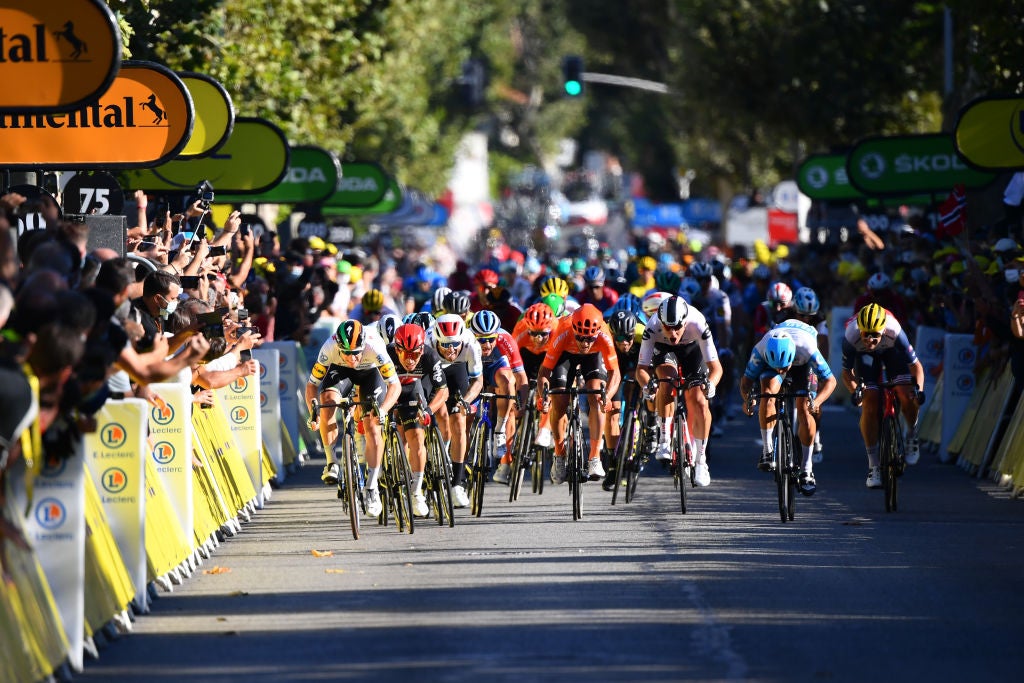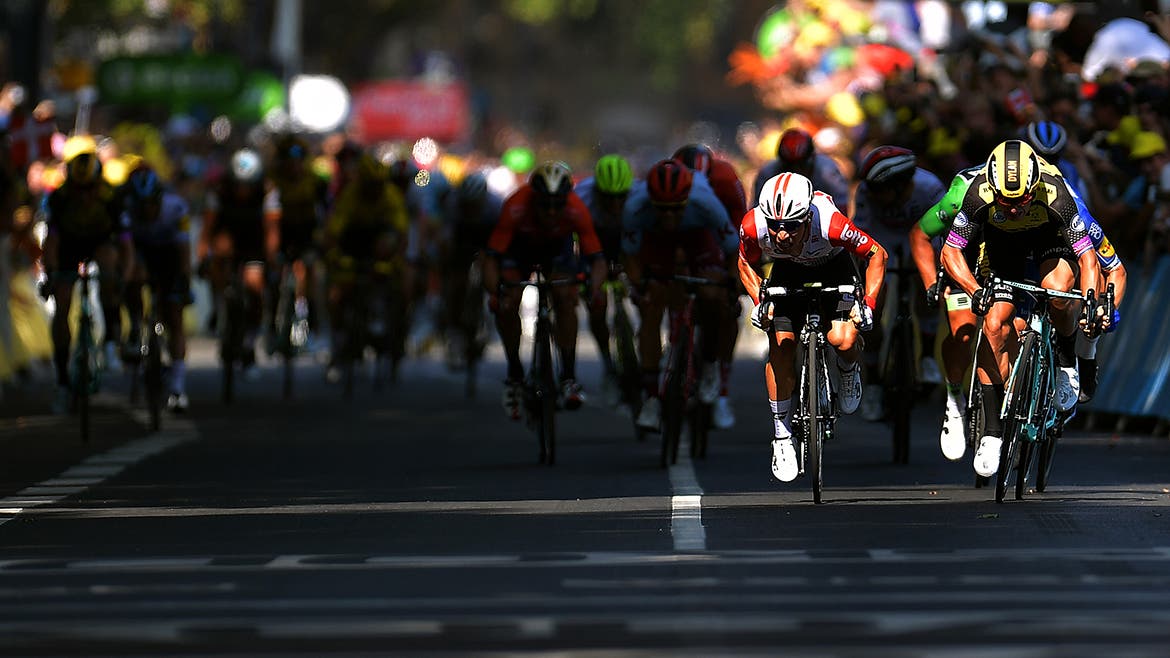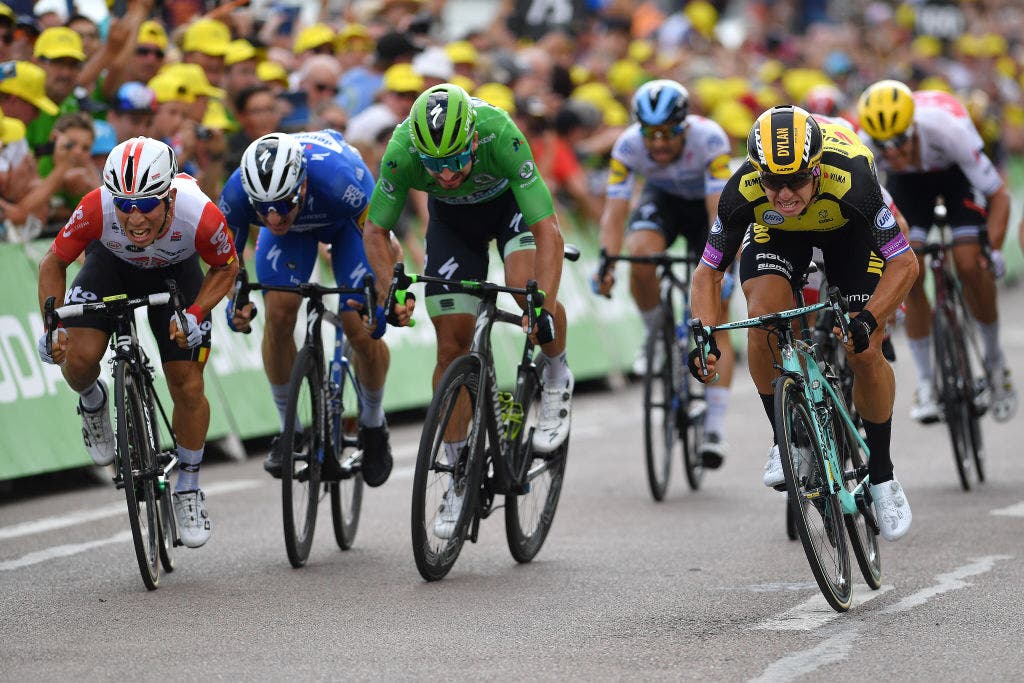Caleb Ewan on Dylan Groenewegen: 'He knows he made a big mistake'

SISTERON, FRANCE - AUGUST 31: Arrival / Sprint / Sam Bennett of Ireland and Team Deceuninck - Quick-Step / Caleb Ewan of Australia and Team Lotto Soudal / Giacomo Nizzolo of Italy and NTT Pro Cycling Team / Hugo Hofstetter of France and Team Israel Start-Up Nation / Peter Sagan of Slovakia and Team Bora - Hansgrohe / Matteo Trentin of Italy and CCC Team / during the 107th Tour de France 2020, Stage 3 a 198km stage from Nice to Sisteron 488m / #TDF2020 / @LeTour / on August 31, 2020 in Sisteron, France. (Photo by Stuart Franklin/Getty Images,)
Caleb Ewan isn’t sure what kind of reception Dylan Groenewegen will receive from the peloton when the Dutchman returns following a racing ban, but the Australian is sure of one thing — Groenewegen’s move to push Fabio Jakobsen into the barriers in last year’s Tour of Poland was wrong.
Related:
- Fabio Jakobsen speaks of his Tour of Poland crash, recovery and future
- Is a nine-month suspension for Dylan Groenewegen too harsh?
“He knows he made a big mistake, everyone else knows he made a big mistake,” Ewan said Saturday. “Have all sprinters moved off their line in a sprint? Yes. But maybe he went a little bit too far across the road. That’s the way he sprints. He’s done it before. What happened to Jakobsen, he never intended it on being so bad. What he did was wrong, so we’ll see what his come back is like.”
Groenewegen was banned for nine months following the high-speed crash in stage 1 of the Polish tour when he closed Jakobsen into the barriers. The Deceuninck-Quick-Step rider crashed horrifically into the barriers and later struck the finish-line arch. Jakobsen nearly died, and following surgeries and a long recovery, he’s only returning to training. It remains to be seen if Jakobsen will race again.
“He admitted he knew what he was doing,” Ewan said of Groenewegen. “As a sprinter, you know when you feel a rider next to you, and if you go all the way to the barrier, you know that rider is going to get crashed onto the barrier. We all move a little bit, we all know the limit. To put someone all the way into the barrier, he pretty much knew what he was doing … it doesn’t matter how safe the barrier is, you know if you’re going to put a rider into a barrier at 80kph, of course, you don’t want the outcome to be so bad, but you know it’s not going to be good.”
Speaking to reporters before heading to a pre-season training camp, Ewan said he expects some challenges ahead of Groenewegen if and when he returns to the top level of racing.
“I think it will be hard for him to come back into the bunch, not because of other riders, but because of himself,” Ewan said. “Maybe he will be a little more nervous than he was before. He was dominant in the way he was sprinting. I don’t know Dylan so well, maybe he’s a guy it doesn’t affect him so much and it will be business as usual. Maybe he could be a very sensitive guy, and it will never be business as usual for him again. I really don’t know him that well to comment on that.
“If it was me, it would be quite mentally hard to rejoin the bunch. You have seen on social media, you see a lot of negative stuff about him, that would also be hard.”
‘Cycling is a dangerous sport’

Rider safety moved into the center of the conversation among key stakeholders in 2020 following Jakobsen’s crash. A series of new steps have been introduced to improve rider safety, but Ewan said most of the top pro riders in the peloton accept the risks.
“Even if they don’t say it, everyone has accepted that it’s part of their job that maybe they’re going to have a big crash at some point of their careers,” Ewan said. “Cycling is a dangerous sport in general. Most of us have accepted it. If they can do something to make it safer, they should try. If there are options for safer barriers, use the safer barriers. At the end of the day, it’s always going to be a really dangerous sport. I don’t know what they can do to make it so much safer.”
If professional bike racing is already dangerous enough with open roads, traffic furniture, bad weather, poor course design, and sometimes-subpar quality of safety barriers, Ewan still said it’s the riders who take the most risks.
“The first thing I am going to say, when you decide to be a sprinter, you know sprinting is not the safest thing in the world,” he said. “Every sprinter you see has accepted that. It doesn’t matter if you’re on a 10-lane road, sprinting is going to be dangerous.
“Generally, the crashes are because of the riders, not because of the barriers. If you crash into the barriers it is usually because another rider has moved you into the barrier. I’m not scared of barriers. If anything, you’re scared of other riders moving in a way that you wouldn’t want them to. It’s been the same since I was a junior. There are always going to be riders who are going to come off their line. They’ve become a lot more strict on that the last few years about riders coming off their line.
“If you go down the barrier with a small gap, you know there is a risk if the rider comes off his line, you might end up in the barrier. All sprinters have taken that sprint in their careers. That’s just part of sprinting. If you crash into a barrier, it’s probably not going to be great.”
Sprint lanes? ‘I hope it will never happen’

One of the ideas considered to make sprinting safer would be to include sprinter lanes in the closing meters, meaning that riders must stay within their designated lanes in the final dash to the line, or face disqualification.
Ewan said he’s fully against that idea.
“That would be the worst thing you could do to a sprint, and I hope that never, ever happens,” Ewan said. “A sprint stage is generally pretty boring already. Most of the sprint teams control the stages, so it’s pretty rare the breaks stay away, so if they make the sprints boring in the end, no one is going to want to watch sprints anymore.
“My sprint in the third stage of the Tour, when I was weaving through the bunch, that’s exciting to watch — not sprinting in one lane,” he said. “I’ve had heard that suggestion. How would that work? What’s stopping a whole team from blocking all the lanes and you cannot come around? I don’t think it will ever happen, I hope it will never happen.
“Sprints are fast, sprints are dangerous. That’s the way it is,” Ewan said. “Every sprinter has accepted that, and the guys who don’t want to accept that are probably not the world’s best sprinters.”